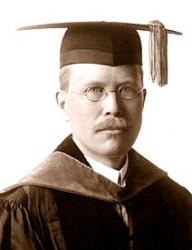Planning worship?
Check out our sister site, ZeteoSearch.org,
for 20+ additional resources related to your search.
- |
User Links
Person Results
Anonymous
Author of "My Country Is the World" in Christian Worship In some hymnals, the editors noted that a hymn's author is unknown to them, and so this artificial "person" entry is used to reflect that fact. Obviously, the hymns attributed to "Author Unknown" "Unknown" or "Anonymous" could have been written by many people over a span of many centuries.
Anonymous
Robert Whitaker
1863 - 1944 Author of "My country is the world" in Hymns of the Rural Spirit b. 1863; clergyman in Calif., Ore., and Wash.; poet; official of American Civil Liberties Union, 1924-26; lecturer
Robert Whitaker
Lindsay B. Longacre

1870 - 1952 Person Name: L. B. Longacre Composer of "NEW AMERICA" in Christian Worship Lindsay Bartholomew Longacre was born in Pottsville, Pennsylvania, on January 26, 1870, the son of Orleans and Rachel (Bartholomew) Longacre. Longacre wanted to become a musician, but pursuant to his father’s wishes, he attended the Columbia University School of Mines and was graduated from there with a degree in mining engineering in 1892. Following a call to the ministry, he attended Drew Theological Seminary, where he received a B.D. degree in 1896, and was subsequently ordained a minister in the Methodist Church that same year.
From 1896-1910, Rev. Longacre served several small churches in the New York Conference.
These included Glenville, St. Luck, Madison Avenue (later called Christ Methodist after a move to a new location), Fifty-Sixth Street Church, Morris Heights, and Woodlawn Heights. His pastorate at Madison Avenue Church was as the Assistant Pastor to Andrew Longacre, his uncle.
In 1910, Dr. Longacre was appointed head of the Department of Old Testament Literature and Religion of the Iliff School of Theology. He held that position for 32 years. On several occasions during his tenure at Iliff, Dr. Longacre also acted as president of the school. He authored four books, a number of articles, and church school curriculum. His books are: A Prophet of the Spirit: A Sketch of the Character and Work of Jeremiah (1917 and 1922); Amos, Prophet of a New Order (1921; translated into Burmese in 1939); Deuteronomy, A Prophetic Lawbook (1924); and The Old Testament: Its Form and Purpose (1945). He was invited to submit three articles to the Abingdon Bible Commentary(1929). These articles are entitled “The Bible as Literature,” Numbers,” and “Joshua.” Dr. Longacre also held membership in the National Association of Biblical Instructors and the Society of Biblical Literature and Exegesis.
During his tenure at Iliff, Dr. Longacre was involved in a controversy known as the “fundamentalist-modernist controversy.” This controversy, which reached its height in the 1920s, grew out of reactions to the liberal approach that the school had taken toward religion and education. These reactions, from both inside and outside the Methodist Church, were in response to the school’s use of higher criticism in the teaching of Biblical studies.
While at Iliff, Dr. Longacre also taught courses in preaching, worship, and hymnology. He had nurtured his love for music as an avocation, and wrote many hymns and songs. Some of these hymns were published in The Riverdale Hymn Book (1912), The Methodist Hymnal (1935), The Hymnal (Evangelical and Reformed Church) (1941), and The Story of Our Hymns: The Handbook to the Hymnal of the Evangelical and Reformed Church (1952). He believed that great hymns were “God-centered.” In addition to composing music, he wrote explanatory notes for various Denver Symphony programs, and had a special love for opera. He also held membership in the Hymn Society of America, the American Guild of Organists, and the Quill Club of New York.
In his courses on worship, Dr. Longacre expected no loess that excellence from his students in planning and leading services. He felt that worship should be be “truly theocentric.” Because of his interests in music and worship, he served on the Commission on Ritual and Orders of Worship of the Methodist Church from 1940-44. The Commission produced a new Book of Worship for Church and Home. Dr. Longacre contributed introductory sentences to accompany selected readings in two sections: “Scriptures for Reading and Meditation” and “Daily Readings and Prayers for a Month.”
Dr. Longacre retired from Iliff in 1942. He and Florence Biggart Longacre, his second wife of six years, then made a brief move to California. (His first wife, Arabella Hyland Longacre, had passed away in 1930.) After returning to Denver, he played a leading role in the 1944 University of Denver production of Thornton Wilder’s Our Town. It was his first acting experience. That same year, the Longacre’s returned to New York City to pursue his interest in music and the arts through the cultural activities of the city. From 1947-1952, Dr. Longacre served as the Assistant Pastor to the Rev. Ralph W. Sockman of Christ Methodist Church.
Dr. Lindsay B. Longacre died at the age of 82 years on September 18, 1952, after a long and distinguished career of service to the church and humanity.
© 2002. Marshall Eidson
http://www.iliff.edu/research/archives/longacre/bio.htm
Lindsay B. Longacre
Robert Bonner
1854 - 1899 Person Name: Robert Bonner, 1854-1899 Composer of "PASTOR REGALIS" in AGO Founders Hymnal Robert Bonner was born in Brighton, England, in 1854. After study at the Leipzig Conservatory, he immigrated to the United States and settled in Providence, Rhode Island, where he taught privately and was organist of St. John's Church. He died in 1899.
--AGO Founders Hymnal, p. 86
Robert Bonner


 My Starred Hymns
My Starred Hymns


